By Ana Rodriguez Soto - The Archdiocese of Miami
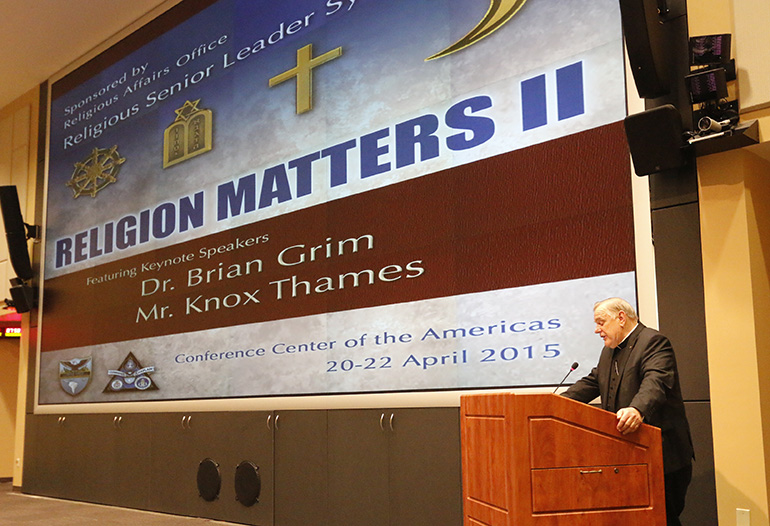
Photographer: ANA RODRIGUEZ-SOTO | FC
Archbishop Thomas Wenski speaks about religious freedom at the Religion Matters II conference at the Doral headquarters of the U.S. Southern Command.
DORAL | Religion and the military: Strange partners?
Not really, says U.S. Army Col. Michael Lembke, chaplain for the U.S. Southern Command.
“A lot of times, religion gets left out” of military planning, he told the Florida Catholic in an interview April 21. And when it’s not ignored, the current trend in the West is to see it as a problem.
“We want to see religion as a factor for good,” said Col. Lembke, chief advisor on religion, ethics and morals to SouthCom’s commander, U.S. Marine Gen. John F. Kelly.
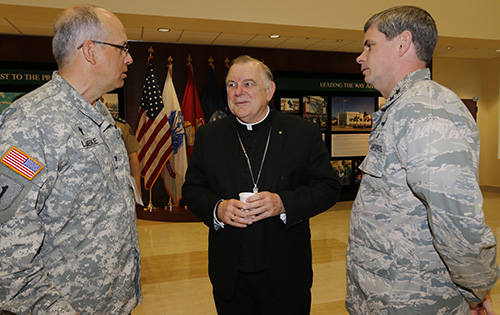
Photographer: ANA RODRIGUEZ-SOTO | FC
Archbishop Thomas Wenski speaks with U.S. Southern Command Chaplain Col. Michael Lembke, left, and Maj. Gen. Michael Plehn, chief of staff, after arriving at SouthCom headquarters in Doral for the Religion Matters II conference.
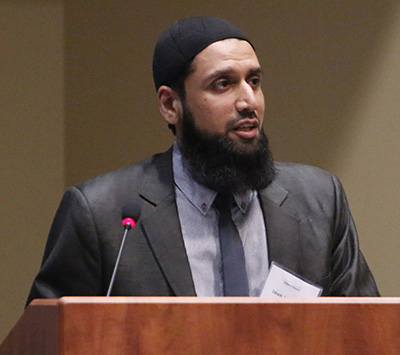
Photographer: ANA RODRIGUEZ-SOTO | FC
Imam Asim Hafiz, Islamic religious advisor to the Ministry of Defence of the United Kingdom, speaks at the Religion Matters II conference.
Col. Lembke has been hosting a series of conferences on “Religion Matters” whose goal is to help participants see religion as “a driver of stability, healing, hope, reconciliation (and) forgiveness.”
The first conference took place last September and the second April 20-22, both at SouthCom’s headquarters in Doral. The second conference featured academics and religious leaders � including Archbishop Thomas Wenski � sharing their expertise with military chaplains from Central and South America and the Caribbean.
Col. Lembke’s words were echoed a few minutes later by Gen. Kelly when he addressed the nearly 60 chaplains via video call.
“By understanding religion we can understand this part of the world,” said Gen. Kelly, a Boston-born Catholic. He noted that “two of the most trusted institutions” in Latin America and the Caribbean are the armed forces and the Catholic Church.
SouthCom’s mission is to bolster U.S. security in the region. That entails countering organized crime and terrorism, responding to disasters, and helping partner nations secure their own stability.
“The work that faith-based groups are doing in Latin America doesn’t just matter. It’s making the world a better place,” Gen. Kelly said. Religion matters “because it literally has the power to transform society.”
And it can do so for better or for worse.
“Whether people like it or not, it’s a faith-based world,” said Imam Asim Hafiz, Islamic religious advisor to the Ministry of Defence of the United Kingdom, and first ever Muslim chaplain to the British armed forces. “Religion is important and it does shape people’s understanding of themselves and others.”
He cited the view in the West that “if you do religion there’s something wrong with you.” But the view in many other societies is “if you don’t do religion, there’s something wrong with you.”
When Western powers ignore religion � or worse, misunderstand it � in places such as Iraq, Afghanistan and the Middle East, “we magnify the voice of the extremist,” Imam Hafiz said.
Archbishop Wenski for his part reminded the chaplains that “religious freedom is the human right that guarantees all other rights.” And it means much more than freedom to worship: It also means “freedom to serve” and “freedom to witness” in the public square.
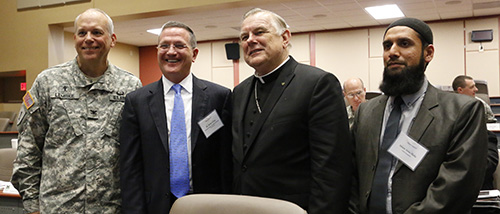
Photographer: ANA RODRIGUEZ-SOTO | FC
Command Chaplain Col. Michael Lembke poses with most of the keynote speakers at the Religion Matters II conference, from left: Brian Grim, president of the Religious Freedom and Business Foundation; Archbishop Thomas Wenski; and Imam Asim Hafiz, Islamic religious advisor to the Ministry of Defence of the United Kingdom.
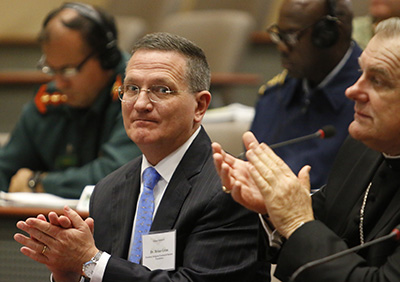
Photographer: ANA RODRIGUEZ-SOTO | FC
Another keynote speaker at the Religion Matters II conference was Brian Grim, president of the Religious Freedom and Business Foundation.
Unfortunately, he noted, Christians are currently suffering persecution in many parts of the world, notably Africa and the Middle East. In the West, more and more liberal democracies are reinterpreting religious freedom narrowly and relegating it “to the private sphere,” with courts “chipping away” at religious freedom in education, health care and family law.
Archbishop Wenski cited a 2011 Pew Research Center study that concluded that “70 percent of the world’s population lives in countries with high restrictions on religious beliefs and practices. And nearly a third of the world’s population lives in countries where either government restrictions on religion or social hostilities involving religion rose substantially in the first decade of the 21st century.”
Given the rapid advances in science and technology, and the cultural changes due to migration, respect for religion is the only way to achieve “peace and creative living,” the archbishop said. “Instead of hostility towards religion, a correct relationship between religious norms and the public sphere can and must be articulated.”
Archbishop Wenski’s words dovetailed with those of Brian Grim, a former researcher for Pew and currently president of the Religious Freedom and Business Foundation
“Religious freedom is a very positive force for social and economic development,” he told the Florida Catholic in an interview prior to his talk.
But while religious freedom and the American way of life may seem synonymous, between 2007 and 2013 the U.S. has seen “a doubling in the level of restrictions (on religion) by government, many of those at the local level,” Grim said, citing a Pew study.
In fact, he noted, the best example of religious freedom today is Brazil, which “has a better record on religious freedom than any other country worldwide.”
Grim called Latin America as a whole “a shining example for the world in terms of stability, religious freedom and how these two work together for the good of society.”
Much of the credit for that state of affairs goes to the Catholic Church, Grim said, and its landmark Vatican II declaration on religious freedom, Dignitatis Humanae. At a time of great religious and cultural change, Church leaders ceased to rely on the state to enforce religious orthodoxy.
“Because the dominant faith supported freedom and not protectionism, that allowed economic development and political stability and improvement in the lives of women and minorities,” he said. “This position of the Catholic Church contributed to peaceful and democratic development in Latin America.”
Brazil in particular “has really a free market when it comes to religion and that’s worked out well for the country,” Grim said. He cited the fact that although gay marriage is legal there it “has not become a polarizing cultural issue.”
“Religion never became a flashpoint,” he said. “When religion becomes part of the conflict, those conflicts are much more difficult to resolve peacefully.”
Grim added that “the positive side of religion, which is huge, can contribute more to the development of society. When we only focus on the negative, we miss the tremendous contributions that are being made by people of faith all over the world.”
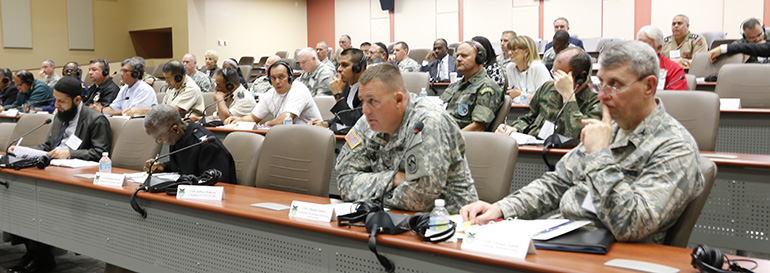
Photographer: ANA RODRIGUEZ-SOTO | FC
Close to 60 military chaplains from South and Central America and the Caribbean attend the Religion Matters II conference at the headquarters of the U. S. Southern Command in Doral.

